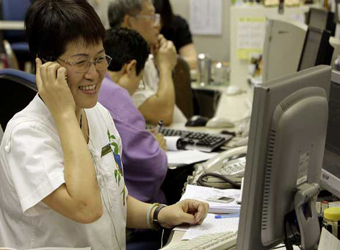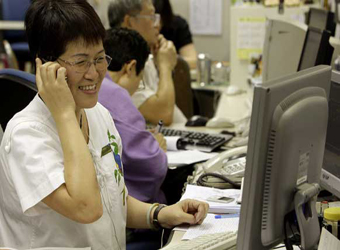The Nikkei 225 added 0.28 percent, with the materials sector contributing to gains. The Topix subindexes for steel and non-ferrous metals were among the best-performing sectors, rising 2.78 percent and 3.06 percent, respectively.
In Seoul, the Kospi firmed as the trading session wore on, with the index last higher by 0.31 percent amid gains in steelmakers and other manufacturing names. Technology stocks were mixed, with Samsung Electronics, an index heavyweight, was up 2.61 percent.
Greater China markets advanced: Hong Kong’s Hang Seng Index rose 1.28 percent, with the energy sector jumping 3.67 percent as large cap oil producers gained on the back of the surge in oil prices. Materials stocks surged 3.91 percent.
Mainland markets also climbed, with the Shanghai composite adding 0.97 percent and the Shenzhen composite rising 0.94 percent.
Over in Sydney, the S&P/ASX 200 edged higher by 0.28 percent. Materials stocks rose after overnight gains in the metals markets on Russia sanction worries, with mining major Rio Tinto jumping 2.75 percent.
The move higher in Asia followed the stronger lead from Wall Street, where robust earnings continued to buoy markets. Both the S&P 500 and the Nasdaq composite notched slim gains on Wednesday, although the Dow Jones industrial average slipped, weighed down by a decline in IBM shares.
Some 79 percent of S&P 500 companies that had reported as of Wednesday morning had topped expectations, according to Thomson Reuters I/B/E/S.
Investors also took a meeting between U.S. President Donald Trump and Japanese Prime Minister Shinzo Abe in their stride after the two leaders pledged to begin trade talks.
“The [Japanese] market welcomed the atmosphere President Trump and Prime Minister Abe made in the joint press conference this morning,” said Masayuki Kubota, chief strategist at Rakuten Securities, adding that Japanese exporters were “sure to benefit” from any free trade agreements between the countries.
Oil prices extended gains after jumping almost 3 percent to their strongest levels since late 2014 in the last session on data that showed a drop in U.S. crude inventories. U.S. West Texas Intermediate crude futures gained 0.58 percent to trade at $68.87 per barrel and Brent crude futures advanced 0.64 percent to $73.95.
The dollar index, which tracks the greenback against a basket of currencies, was mostly steady at 89.644. Against the yen, the dollar extended overnight gains to trade at 107.39 at 12:12 p.m. HK/SIN.
Meanwhile, the British pound was on the back foot after slipping in the last session on the back of March U.K. inflation coming in at a one-year low. The currency last traded at $1.4199 after touching a post-Brexit high earlier this week.
While cooling inflation pressure in March “will not be enough to dissuade the Bank of England from raising rates at the May meeting,” a continued fall will “question the necessity for further rate increases in November,” Elias Haddad, senior currency strategist at Commonwealth Bank of Australia, said in a note.
Among individual movers, miner BHP advanced 2.66 percent after announcing an 8 percent increase in third-quarter iron ore production, although it also slightly cut fiscal year 2018 guidance for iron ore.
Elsewhere, shares of Korean Air Line fell 3.34 percent amid Reuters headlines that police had raided the company’s offices as part of an investigation into Chairman Cho Yang-ho’s daughter.
Meanwhile, telecommunications equipment maker ZTE said it would postpone reporting first-quarter earnings, originally due on Thursday, pending a review on the effect a U.S. ban would have on the company, in a filing to the Hong Kong exchange.


